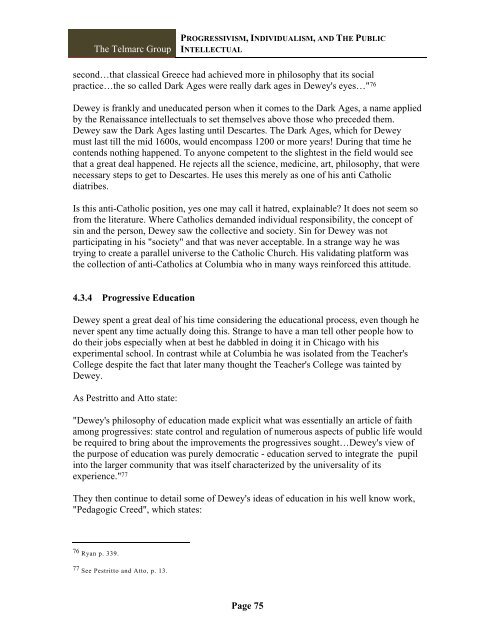progressivism, individualism, and the public ... - Telmarc Group
progressivism, individualism, and the public ... - Telmarc Group
progressivism, individualism, and the public ... - Telmarc Group
Create successful ePaper yourself
Turn your PDF publications into a flip-book with our unique Google optimized e-Paper software.
The <strong>Telmarc</strong> <strong>Group</strong><br />
PROGRESSIVISM, INDIVIDUALISM, AND THE PUBLIC<br />
INTELLECTUAL<br />
second…that classical Greece had achieved more in philosophy that its social<br />
practice…<strong>the</strong> so called Dark Ages were really dark ages in Dewey's eyes…" 76<br />
Dewey is frankly <strong>and</strong> uneducated person when it comes to <strong>the</strong> Dark Ages, a name applied<br />
by <strong>the</strong> Renaissance intellectuals to set <strong>the</strong>mselves above those who preceded <strong>the</strong>m.<br />
Dewey saw <strong>the</strong> Dark Ages lasting until Descartes. The Dark Ages, which for Dewey<br />
must last till <strong>the</strong> mid 1600s, would encompass 1200 or more years! During that time he<br />
contends nothing happened. To anyone competent to <strong>the</strong> slightest in <strong>the</strong> field would see<br />
that a great deal happened. He rejects all <strong>the</strong> science, medicine, art, philosophy, that were<br />
necessary steps to get to Descartes. He uses this merely as one of his anti Catholic<br />
diatribes.<br />
Is this anti-Catholic position, yes one may call it hatred, explainable? It does not seem so<br />
from <strong>the</strong> literature. Where Catholics dem<strong>and</strong>ed individual responsibility, <strong>the</strong> concept of<br />
sin <strong>and</strong> <strong>the</strong> person, Dewey saw <strong>the</strong> collective <strong>and</strong> society. Sin for Dewey was not<br />
participating in his "society" <strong>and</strong> that was never acceptable. In a strange way he was<br />
trying to create a parallel universe to <strong>the</strong> Catholic Church. His validating platform was<br />
<strong>the</strong> collection of anti-Catholics at Columbia who in many ways reinforced this attitude.<br />
4.3.4 Progressive Education<br />
Dewey spent a great deal of his time considering <strong>the</strong> educational process, even though he<br />
never spent any time actually doing this. Strange to have a man tell o<strong>the</strong>r people how to<br />
do <strong>the</strong>ir jobs especially when at best he dabbled in doing it in Chicago with his<br />
experimental school. In contrast while at Columbia he was isolated from <strong>the</strong> Teacher's<br />
College despite <strong>the</strong> fact that later many thought <strong>the</strong> Teacher's College was tainted by<br />
Dewey.<br />
As Pestritto <strong>and</strong> Atto state:<br />
"Dewey's philosophy of education made explicit what was essentially an article of faith<br />
among progressives: state control <strong>and</strong> regulation of numerous aspects of <strong>public</strong> life would<br />
be required to bring about <strong>the</strong> improvements <strong>the</strong> progressives sought…Dewey's view of<br />
<strong>the</strong> purpose of education was purely democratic - education served to integrate <strong>the</strong> pupil<br />
into <strong>the</strong> larger community that was itself characterized by <strong>the</strong> universality of its<br />
experience." 77<br />
They <strong>the</strong>n continue to detail some of Dewey's ideas of education in his well know work,<br />
"Pedagogic Creed", which states:<br />
76 Ryan p. 339.<br />
77 See Pestritto <strong>and</strong> Atto, p. 13.<br />
Page 75












